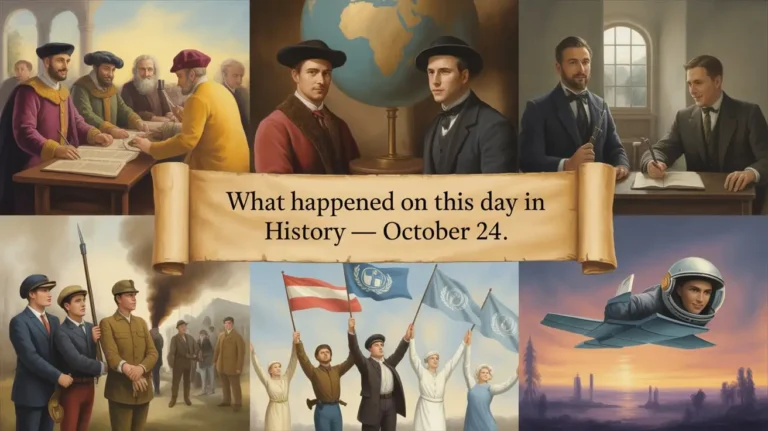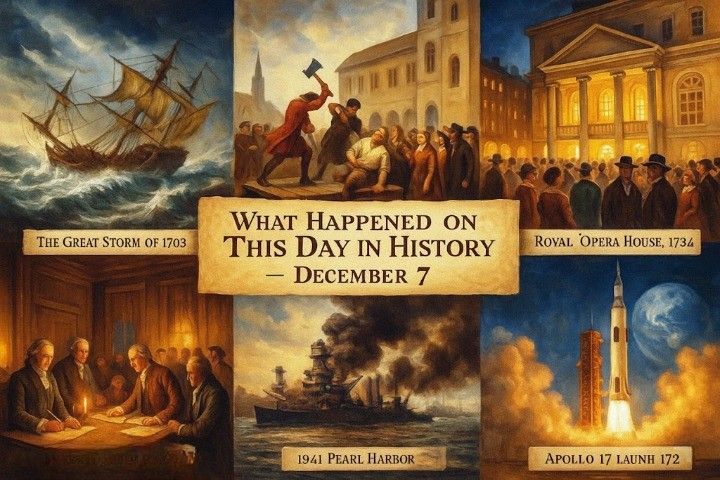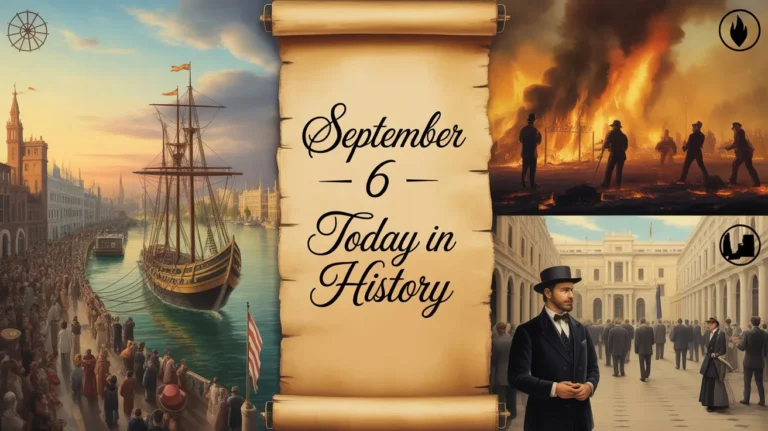August 26 has carried tides of conquest, revolution, discovery, and hard-won rights. Today in History reminds us that from ancient campaigns to modern spaceflight, this date threads together moments that changed nations—and how people live within them. Here are some of the most important events that happened on this day.
55 BC – Julius Caesar Invades Britain
On this day in 55 BC, Julius Caesar crossed the English Channel with Roman legions, probing the shores of Britain for the first time. The expedition was brief and met with stiff resistance and poor weather, so Rome withdrew. Yet Caesar’s landing altered Roman thinking and paved the way for a fuller invasion a year later. The encounters began centuries of political, cultural, and economic entanglement between Britain and the Roman world.
1071 – The Battle of Manzikert
The Byzantine Empire suffered a crushing defeat at Manzikert to the Seljuk Turks under Alp Arslan. Emperor Romanos IV Diogenes was captured, and Byzantine control over much of Anatolia began to unravel. The loss marked a turning point, weakening the empire and accelerating Turkish settlement in the region. In the longer arc of history, Manzikert helped set conditions that would lead to the Crusades.
1346 – The Battle of Crécy
Edward III’s English army shocked medieval Europe by decisively defeating French forces at Crécy during the Hundred Years’ War. English longbowmen devastated heavily armored knights, revealing the limits of chivalric cavalry charges. The victory showcased discipline, terrain, and technology over traditional notions of noble warfare. Crécy changed battlefield tactics for generations.
1429 – Joan of Arc Reaches the Outskirts of Paris
Fresh from earlier victories, Joan of Arc brought French forces to the gates of Paris, hoping to liberate the city. The assault faltered, and Joan herself was wounded in the fighting. Though she didn’t take Paris, her audacity rallied French morale and kept pressure on the English. Joan’s legend—courageous, visionary, and ultimately sacrificial—only grew.
1498 – Michelangelo Commissioned to Sculpt the Pietà
A young Michelangelo received the commission for the Pietà, a work that would astonish Rome with its serenity and technical perfection. Carved from a single block of marble, it portrays Mary cradling the lifeless Christ with tender realism. Completed when he was in his early twenties, it announced Michelangelo’s genius to Europe. The Pietà remains one of the crown jewels of Renaissance art.
1768 – Captain James Cook Sets Sail
James Cook departed Plymouth aboard HMS Endeavour on his first great voyage. Officially, he went to observe the transit of Venus; unofficially, he was tasked with exploring the South Pacific. The expedition transformed European maps and knowledge, documenting coastlines, peoples, plants, and skies. Cook’s meticulous charts guided sailors for decades.
1789 – Declaration of the Rights of Man and of the Citizen
France’s National Assembly adopted a revolutionary charter proclaiming liberty, property, security, and resistance to oppression. Drawing on Enlightenment ideas, it rejected privilege based on birth and asserted equality before the law. Its language radiated across the Atlantic and into future constitutions and movements. The document remains a cornerstone of modern human rights.
1847 – Liberia Declares Independence
Liberia, founded largely by formerly enslaved people from the United States, declared itself a sovereign republic. The move made it the first independent modern state in Africa. Liberia’s flag, constitution, and capital echoed American models while forging a distinct identity. Its independence became a symbol—complex and contested—of African self-rule in an age of empire.
1883 – Krakatoa Erupts
The Indonesian volcano Krakatoa roared to life in one of the most violent eruptions ever recorded. Explosions shattered the island, sent tsunamis racing across the seas, and darkened skies around the world. More than 36,000 people died, and global temperatures dipped as ash circled the planet. Vivid sunsets painted canvases and diaries for months, a haunting afterglow of nature’s power.
1895 – Niagara Falls Generates Electric Power
Engineers harnessed the thunder of Niagara Falls to produce large-scale hydroelectric power. The achievement showcased alternating current systems and proved that clean, renewable sources could power cities. Within years, electricity from Niagara lit communities and drove industry across the region. It marked a milestone at the dawn of the electrified age.
1914 – The Battle of Tannenberg Begins
In the early days of World War I, German commanders Paul von Hindenburg and Erich Ludendorff moved to encircle Russian forces in East Prussia. Over several days, the Germans executed a masterclass in rail mobility and intelligence. The result was a devastating Russian defeat, with tens of thousands captured. Tannenberg became a propaganda triumph and boosted German morale.
1914 – Togoland Surrenders to the Allies
The German colony of Togoland (modern Togo) fell to British and French forces, the first German colony to do so in the war. Telegraph lines and a powerful wireless station made it strategically valuable. After brief fighting, colonial authorities capitulated to superior Allied forces. The surrender foreshadowed the dismantling of Germany’s overseas empire.
1920 – The 19th Amendment Certified in the United States
On this day, the U.S. formally certified the amendment guaranteeing women the right to vote. It capped decades of marches, lobbying, arrests, and tireless organizing by suffragists. The victory didn’t end the struggle—many women of color still faced barriers for decades—but it reshaped the electorate. American democracy widened, and politics would never be the same.
1939 – Baseball’s First Televised Games
Major League Baseball stepped into the television era with a Reds–Dodgers doubleheader broadcast to early TV sets. The audience was tiny, but the moment was huge: sports and screens found a lifelong partnership. Television would soon transform leagues, advertising, and fandom. The way billions experience sports today traces back to this broadcast.
1936 – The Anglo-Egyptian Treaty Signed
Britain recognized Egypt as a sovereign state after half a century of occupation, while retaining a military presence to guard the Suez Canal. The agreement was both a milestone and a compromise, reflecting the geopolitics of empire and oil. Egyptian nationalists hailed it as progress but pressed for full independence. The canal’s importance ensured that Egypt remained central to global strategy.
1973 – Women’s Equality Day Established (U.S.)
To honor the suffrage victory, August 26 was proclaimed Women’s Equality Day. The observance recognizes achievements while spotlighting unfinished work on political, social, and economic equality. Over time, it has become a rallying day for advocacy, education, and reflection. Each year, it asks how far we’ve come—and how far we still have to go.
1978 – Cardinal Albino Luciani Becomes Pope John Paul I
The college of cardinals chose Albino Luciani, remembered as the “Smiling Pope,” for his warmth and simplicity. His brief 33-day papacy surprised the world with its humility and pastoral tone. Though short, it left a gentle imprint on the Church’s spirit and priorities. His immediate successor, John Paul II, would carry that double name into a long, transformative era.
1978 – Sigmund Jähn Becomes the First German in Space
East German pilot Sigmund Jähn launched aboard Soyuz 31, joining the Interkosmos program. His flight broadened the circle of human spacefarers beyond the superpowers’ nationals. For Germany, divided at the time, it was a moment of scientific pride and soft-power signaling. Jähn’s mission encouraged new generations to look up—and study STEM.
1992 – No-Fly Zone Imposed Over Southern Iraq
The United States, Britain, and France enforced a no-fly zone to protect Shiite communities from Saddam Hussein’s forces. It reflected a new era of post–Cold War interventions shaped by humanitarian concerns and regional stability. The policy constrained Baghdad’s air power and complicated Iraqi military planning. It also sparked debate about sovereignty, international law, and long-term strategy.
2009 – Japan Launches HTV-1 to the ISS
Japan’s first H-II Transfer Vehicle blasted off to resupply the International Space Station. The flight demonstrated Japan’s growing capabilities in autonomous rendezvous and cargo delivery. It strengthened international cooperation that keeps the orbiting laboratory alive and productive. HTV missions would become a dependable lifeline for science in microgravity.
2011 – Hurricane Irene Bears Down on the U.S. East Coast
Emergency declarations and evacuations rolled out as Irene churned northward, threatening major population centers. The storm disrupted transport, power, and coastal communities across several states. Irene underscored the rising costs of extreme weather for infrastructure and insurers alike. It also accelerated conversations about preparedness and resilience.
Famous Births (August 26)
1743 – Antoine Lavoisier:
French chemist, often called the “Father of Modern Chemistry,” who helped systematize chemical nomenclature and identified oxygen’s role in combustion.
1873 – Lee De Forest:
American inventor whose triode vacuum tube amplified signals and jump-started radio and early electronics.
1910 – Mother Teresa:
Catholic nun and Nobel Peace laureate, renowned for her work among the poor in Calcutta.
1938 – Jet Black:
English drummer and co-founder of the punk band The Stranglers.
1970 – Melissa McCarthy:
American actress and comedian with standout roles in film and television.
1980 – Chris Pine:
American actor known for Star Trek, Wonder Woman, and more.
Notable Deaths (August 26)
1278 – Ottokar II of Bohemia:
King of Bohemia, killed at the Battle on the Marchfeld, ending his regional ascendancy.
1723 – Antonie van Leeuwenhoek:
Dutch pioneer of microscopy whose lenses opened the microbial world to science.
1958 – Ralph Vaughan Williams:
English composer whose symphonies and choral works shaped 20th-century classical music.
1974 – Charles Lindbergh:
American aviator, first to fly solo nonstop across the Atlantic in 1927.
2015 – Amelia Boynton Robinson:
American civil-rights leader, a Selma March organizer who helped pave the way for the Voting Rights Act.
2018 – Neil Simon:
Prolific American playwright behind The Odd Couple, Barefoot in the Park, and more.
Final Thoughts
That was Today in History: August 26—a date of declarations and discoveries, defeats and firsts. From the roar of Krakatoa to the quiet triumph of a ballot, these moments show how history swings on courage, ideas, and ingenuity. Which of these events feels most relevant today?
FAQs for August 26

Q1. What day is celebrated on August 26?
A1. August 26 is celebrated as Women’s Equality Day in the United States, marking the certification of the 19th Amendment in 1920 that granted women the right to vote.
Q2. What is an interesting fact about August 26?
A2. On August 26, 1920, the 19th Amendment to the U.S. Constitution was officially certified, ensuring women’s suffrage across the nation.
Q: What’s an interesting fact for today?
One fascinating fact about August 26 is that in 1978, Cardinal Albino Luciani was elected Pope John Paul I, though his papacy lasted only 33 days, making it one of the shortest in history. His warm personality and simple style earned him the nickname the “Smiling Pope.” Even though his reign was brief, he left a lasting impression on millions of Catholics.
Q4. What recent event in history is connected with August 26?
A4. On August 26, 1978, Cardinal Albino Luciani was elected Pope John Paul I, though his papacy lasted only 33 days.
Q: Which famous wars are connected to August 26?
One of the most notable conflicts on this day is the Battle of Crécy (1346), where the English longbowmen decisively defeated the French during the Hundred Years’ War. Another remarkable event is the victory of Alp Arslan, the Seljuk Sultan, who led his forces to a historic triumph at the Battle of Manzikert in 1071. This victory against the Byzantine Empire changed the balance of power in the region and opened Anatolia to Turkish settlement.
Q6. What famous people were born on August 26?
A6. Some notable birthdays on August 26 include Mother Teresa (1910), Nobel Peace Prize laureate, and Macaulay Culkin (1980), the actor best known for Home Alone.
Q7. What historical milestone happened on August 26 in science?
A7. On August 26, 1959, the British Motor Corporation introduced the Mini, a revolutionary small car that became an icon of automotive design.






